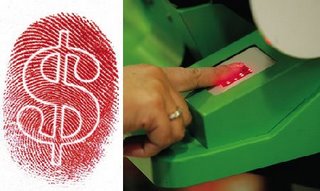
Need Cash? Call a Hedge Fund
Some Young Tech Companies Move Beyond Venture Capital; "Email Me When You Go Public"
By REBECCA BUCKMAN April 5, 2006; Page C1
 When fast-growing technology company Pay By Touch went looking for cash slightly over a year ago, it met with private-equity firms and venture capitalists. But the closely held San Francisco firm wound up taking money from a different type of investor: hedge funds.
When fast-growing technology company Pay By Touch went looking for cash slightly over a year ago, it met with private-equity firms and venture capitalists. But the closely held San Francisco firm wound up taking money from a different type of investor: hedge funds.Pay By Touch makes biometric identification gizmos that read fingerprints so shoppers can automatically pay for what they buy out of bank or credit accounts. Giant hedge funds, including Farallon Capital Management and Och-Ziff Capital Management, helped it raise $130 million in September.
About two months ago, the company, whose official name is Solidus Networks Inc. but does business as Pay By Touch, snared another $60 million, about half of it from hedge funds. These lightly regulated investment vehicles typically invest in publicly traded stocks and other liquid assets rather than private companies.
"There's not a company around that wouldn't want to do what we've done," says Pay By Touch Chief Executive John Rogers, who says investors view the company as being about a year away from an initial public offering of stock.
Hedge funds often make quicker investment decisions than venture capitalists and can offer more money -- though some say they may not scrutinize private companies enough before investing. Farallon declined to comment, and Och-Ziff didn't return a call seeking comment.
As other private firms wait for the moribund market for venture-backed IPOs to open up, they also are starting to tap the pool of hedge-fund cash. Microbia Inc., a Cambridge, Mass., pharmaceutical company, raised $75 million in February, a little less than a third of it from two hedge funds. ITA Software Inc., a Cambridge, Mass., maker of software for the airline industry, raised $100 million in January from a syndicate including three venture-capital firms, a buyout firm and a hedge fund. Just this week, another Massachusetts drug company, Merrimack Pharmaceuticals Inc., said it collected about half its latest, $65 million funding round from hedge funds.
Because hedge funds tend to be secretive, there are no estimates of the total they have invested in private start-up companies. In some ways the trend is a replay of the late 1990s, when hedge funds also moved into the venture arena, with mixed success, clamoring for cheap shares of private companies, including hot dot-coms, right before they went public.
The difference today is that it's more difficult to take small high-tech companies public. Hedge funds now are mainly trying to deploy the enormous amounts of capital they have raised over the last several years and diversify their investments, since returns haven't been stellar for most public stocks. Hedge funds currently have an estimated $1.5 trillion under management world-wide, compared with about $261 billion for venture-capital firms in the U.S., according to data from HedgeFund Intelligence Ltd. and the U.S. National Venture Capital Association.
Investing in private companies has risks -- for the hedge funds, for the companies they invest in, and for venture capitalists, who already are competing furiously for deals. "These guys could shift 5% of their money into venture and swamp VCs," says Kate Mitchell, a managing director with BA Venture Partners in Foster City, Calif. They could "massively overfund" small companies, she says, thus reducing returns for everyone.
Paying Down Debt
 Some venture capitalists say hedge funds now are willing to make investments of $20 million to $30 million, not an unusual size for a later-stage, venture-capital deal. Some hedge funds take equity stakes in firms just as venture investors have done.
Some venture capitalists say hedge funds now are willing to make investments of $20 million to $30 million, not an unusual size for a later-stage, venture-capital deal. Some hedge funds take equity stakes in firms just as venture investors have done.Hedge funds sometimes provide financing in the form of loans or special debt securities, which start-ups could have trouble paying down. Having debt on the books also could make it tougher for start-ups to attract other investors if they don't grow as expected.
Some money Pay By Touch raised from hedge funds last year came in the form of convertible debt and senior notes. Pay By Touch's chief financial officer, Gus Spanos, says that kind of funding "does carry more risk" than selling an equity stake but "we're comfortable with the trade-off."
For private companies, hedge-fund investments can be very alluring. Because the funds typically make many more investments than venture-capital firms, they can offer capital at attractive prices and don't depend as much on outsized returns to make up for the many failures of small companies. Hedge-fund managers, accustomed to darting quickly in and out of stock positions, also have a reputation for making investment decisions quickly -- another plus for private companies anxious to snare cash.
Venture capitalists often can't compete with hedge funds that value private companies more richly. "It's happened to everybody," says Bruce Evans, a managing partner at Summit Partners in Boston, which does venture capital and larger buyouts. Also, debt financing can prevent further dilution of founders' stakes in their own companies, if hedge funds don't take equity stakes. Mature companies that succeed in robust markets can do well by taking hedge-fund money, investors and academics say.
And hedge funds often have a more relaxed management style. A venture capitalist "might be camping out in your conference room, asking all kinds of annoying questions," says Bill Burnham, a former managing director with Mobius Venture Capital who is now a private investor (Mobius. by the way. is also a PBT Investor) The attitude of a hedge-fund manager, he says, might be, "Here's your check -- email me when you go public."
A Need to Nurture
Still, hedge funds generally don't have much experience dealing with small, private firms, which often need nurturing to succeed. As short-term investors, hedge funds might not stick with an investment for years as a company matures, as venture capitalists do.
"Hedge funds will be fickle," says William Sahlman, a professor specializing in entrepreneurial management at Harvard Business School. "If a few successes occur, money will pour in quickly....A few disasters, on the other hand, will stop the practice overnight."
Unlike venture capitalists, who generally wait to take profits themselves until they have actually realized gains on an investment, such as through an IPO or sale of a company, hedge funds often take profits from investments once a year, based on estimated gains. So if hedge funds overvalue private-company investments -- a process that can be subjective -- their long-term investors could lose out if the investments ultimately crash and burn. Some hedge funds are adopting new valuation rules to deal with these situations.
If start-up founders believe "all money is green, so whoever pays them the highest price wins," they may go to a hedge fund for financing, says Tom Crotty, a general partner with Battery Ventures in Wellesley, Mass. He says most young firms will pay extra for the advice and connections of venture-capital firms.
JBF Comment: The management at Pay by Touch is so impressive and seasoned that they simply didn't need one of the major services (which is also a costly one) provided by VC's, which is to find prime management candidates to place in key management positions. That service is part of the package and apparently the VC's weren't interested in structuring a deal that didn't tap into, or more accuratelyt, "charge" for that service. The Hedge Fund companies apparently were. I think the CEO is right when he states unequivocally that, "There isn't a company out there that wouldn't have done what we have done".
Especially a company with an elite management force such as PBT's. Pay By Touch brings together a team of seasoned veterans from virtually every discipline in the technology and financial services sectors.
Related Links: San Francisco start-up Pay By Touch didn't take venture-capital money when it sought $130 million in new financing for its biometric fingerprint-reading system (US News and World Report Article: "Hedging Their Debts"
Especially a company with an elite management force such as PBT's. Pay By Touch brings together a team of seasoned veterans from virtually every discipline in the technology and financial services sectors.
Related Links: San Francisco start-up Pay By Touch didn't take venture-capital money when it sought $130 million in new financing for its biometric fingerprint-reading system (US News and World Report Article: "Hedging Their Debts"
.jpg)